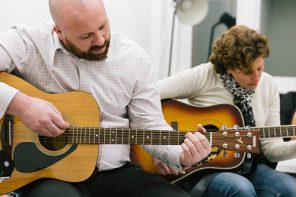What is the story of your accent? Can it tell me about the place you grew up, the places you moved to, where your parents came from, your socio-economic background, your education? Your accent holds the story of you. Some linguists even suggest that accents are affected by the geographical landscape where we live. Perhaps the straight-forward quality of the New York City accent is due to the grid layout of Manhattan, or the rolling sounds of the Yorkshire accent due to the ups and downs of the dales.
I grew up with a Dutch mother and a Swedish father in Sweden. Growing up near Wallander’s Ystad I developed the classic Southern Swedish guttural “R”s, but the vowel sounds came from my dad’s West-Swedish accent. In Sweden, actors generally speak Standard Swedish, alternatively with a Stockholm accent. I very rarely heard my accent represented on stage or screen, and if I did it was always a caricature. Even Wallander himself, a character born and bred in Ystad, spoke with a Stockholm accent. I learned to speak in my Southern accent but sing in Standard Swedish. As a child, me and my friends even played in a Stocholm accent as every Disney film we had ever seen was dubbed into a Stockholm accent. That’s just how it was.
When I started auditioning for drama schools in Sweden I felt incredibly self-aware and even ashamed of my Southern twang, but changing it to imitate the Standard Swedish I heard on TV felt… well, just not like me. It wasn’t until I came to train at The Royal Central School of Speech and Drama in London, that I fully learned to appreciate my accent. Accent technique is a huge part of contemporary actor training in the UK. During my training, we didn’t just learn how to do a range of accents (Scottish, Essex, General American, South African…) but also how to celebrate and be clear in our own, native accents. We learned how to speak with Received Pronunciation as a tool we could choose to apply or not apply depending on the context, rather than a “one size fits all” concept. Accents were simply another aspect of building a character. Thought. Feeling. Body. Voice.
What’s wonderful about accents is that they are always changing. Sometimes over time, sometimes with our emotions and other times from one conversation to another. I think many of us can relate to the horror of catching oneself unintentionally copying the other person’s accent mid-conversation. It may feel embarrassing or even insulting, but the reason we do it is empathy. We mirror the person in front of us to understand them better. To feel what they feel. Instinctively we know that the way a person speaks tells us about their story.





